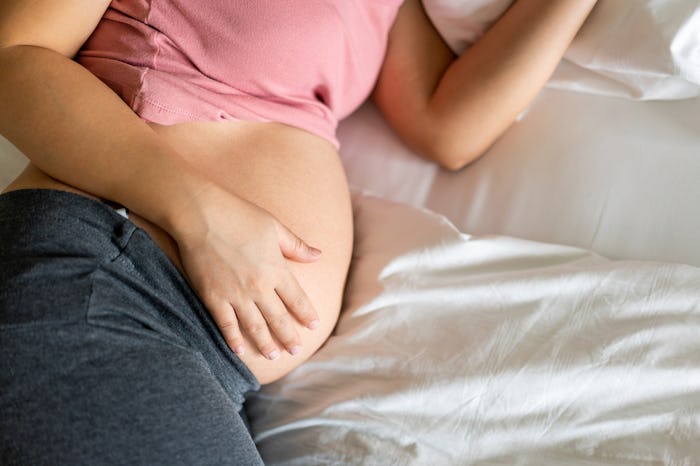Life

Scientific Research Confirms That, Yup, Sleep During Pregnancy Is Pretty Terrible
Sometimes when I wake up in the night now, I realize I'm not pregnant anymore and I get to go back to sleep with a smile on my face. Because after being pregnant four times, I will probably never get over the simple joy of regular sleep becoming a part of my life again. And I'm not sure people fully understand just how difficult it can be to sleep when you're pregnant. In fact, there's even data to back that up. According to recent research from Fitbit, pregnancy sleep is actually much worse than you probably thought.
Fitbit Labs recently collected data from thousands of women between the ages of 20 to 35 years old who used the Fitbit Labs New Parent app between September 2017 and May 2019 to get a sense of their sleep patterns. The app's clock face was initially introduced to help parents better monitor their new baby's schedule with things like feedings, diaper changes, and, of course, sleep. The intention behind the Fitbit Labs New Parent app being to give new parents the opportunity to see routine patterns with their baby, but researchers also found some interesting data before the baby was even born.
After culling through thousands of anonymous entries, Fitbit Lab researchers were able to get a clearer picture of what sleep looks like for pregnant women. An spoiler alert: It's not awesome.
According to the Fitbit Lab research, shared with Romper, pregnant women experience declining quality of sleep throughout their pregnancy. During the first trimester — when pregnancy hormones first hit, as noted by the National Sleep Foundation, and everyone gets extra exhausted and maybe even ends up falling asleep sitting up in public — pregnant women get about 30 minutes extra sleep per night on average. But don't get too excited because those extra zzz's do not last.
As their pregnancy continues, according to the research, women get less sleep all the time. Between the physical discomfort of a human growing inside you and the emotional stress of realizing you are going to be taking care of that human once they are outside your body, it's no wonder pregnant women struggle with a good night's sleep. By the last week of their third trimester, the research found pregnant women were sleeping an average of 36 minutes a night less.
Expectant mothers are also 10 percent more likely to wake up in the night in their third trimester, and the number of women taking naps goes up from 10 percent to 18 percent by the third trimester as well, according to FitBit's data. Perhaps because they are experiencing a worse quality of sleep; the data found that women experienced a significant drop in deep sleep by the end of their pregnancy, and it was slow to return after the baby's arrival. In fact, sleep continues to elude women once the baby arrives. Five months after the baby's birth, new moms are still getting 15 minutes less sleep than their original baseline.
FitBit's data backs up previous research done on sleep during and after pregnancy. Research dating back to 1998 from the National Sleep Foundation found that 78 percent of pregnant women experienced "disturbed sleep" during pregnancy than at other times, while research published in the journal Sleep found that new parents' "sleep satisfaction and duration did not fully recover for up to 6 years after the birth of their first child."
I doubt there are too many new moms out there who are surprised to find that pregnant women don't get a great night's sleep. But there is something to be said for knowing you're not alone.